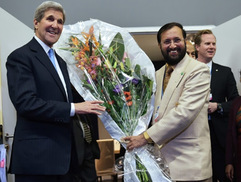
PARIS- India on Dec 12 termed as balanced the final draft text for a climate change deal, as it inched towards limiting global warming to 2 degrees Celsius and even 1.5 degrees later and getting rich nations to commit $100 billion annually from 2020 to fund emerging economies in pursuing their growth ambitions without harming the environment. “After the first glance of the final text, we are happy that the text contains...

and takes care of the concerns of India,” Environment and Forests Minister Prakash Javadekar said, as members from 196 countries burnt the midnight oil and a day-long extension of the climate conference to clinch a deal.
“It is linked with the convention,” he said referring to the United Nations Framework Convention for Climate Change, and its stated objective of common but differentiated responsibilities towards protecting the environment for the rich, poor and the developing world. “The differentiation for developed and developing countries is mentioned across all pillars of action, that is mitigation, adaptation, finance, technology capacity and transparency. That is a very, very important thing,” the Indian minister said, adding: “It is a way forward for the world.”
He also said the two causes spelt out clearly by India — of sustainable lifestyle and climate justice — had both been addressed in the final draft text. “That is an important achievement for India. These two concepts were put up very forcefully by India in the last one year.” The ball had been set rolling earlier in the day by French President Francois Hollande himself. “If there can be a landmark agreement for the planet, it’s now. It’s rare in life to have the opportunity to change the world. You have it,” Hollande told the conference, referring to the 31-page draft final text of the pact, while also requesting the negotiators to adopt it.
Hollande, who joined the conference on Saturday to lend some political weight to the negotiations and gave some time to the interlocutors to study the draft final text, also called Prime Minister Narendra Modi for India’s support as a key member among the 196 negotiating countries.
UN Secretary General Ban Ki-moon also pressed the negotiators not to let go of the opportunity. “We must protect the planet that sustains us. We need all our hands on deck,” he told journalists here. Ahead of the Paris meeting, India had submitted on Oct 2, its action plan on climate change, called Intended Nationally Determined Contributions, pledging to reduce the carbon intensity by 33-35 percent over 15 years, while also pursuing its own sustainable development agenda. India’s position of strength at the conference was evident, as even US President Barack Obama called up Modi to discuss the climate conference. “Both leaders emphasised their personal commitment to secure a strong climate change agreement this week and their interest in our countries’ working together to achieve a successful outcome,” a White House readout of the call said. (IANS)
“It is linked with the convention,” he said referring to the United Nations Framework Convention for Climate Change, and its stated objective of common but differentiated responsibilities towards protecting the environment for the rich, poor and the developing world. “The differentiation for developed and developing countries is mentioned across all pillars of action, that is mitigation, adaptation, finance, technology capacity and transparency. That is a very, very important thing,” the Indian minister said, adding: “It is a way forward for the world.”
He also said the two causes spelt out clearly by India — of sustainable lifestyle and climate justice — had both been addressed in the final draft text. “That is an important achievement for India. These two concepts were put up very forcefully by India in the last one year.” The ball had been set rolling earlier in the day by French President Francois Hollande himself. “If there can be a landmark agreement for the planet, it’s now. It’s rare in life to have the opportunity to change the world. You have it,” Hollande told the conference, referring to the 31-page draft final text of the pact, while also requesting the negotiators to adopt it.
Hollande, who joined the conference on Saturday to lend some political weight to the negotiations and gave some time to the interlocutors to study the draft final text, also called Prime Minister Narendra Modi for India’s support as a key member among the 196 negotiating countries.
UN Secretary General Ban Ki-moon also pressed the negotiators not to let go of the opportunity. “We must protect the planet that sustains us. We need all our hands on deck,” he told journalists here. Ahead of the Paris meeting, India had submitted on Oct 2, its action plan on climate change, called Intended Nationally Determined Contributions, pledging to reduce the carbon intensity by 33-35 percent over 15 years, while also pursuing its own sustainable development agenda. India’s position of strength at the conference was evident, as even US President Barack Obama called up Modi to discuss the climate conference. “Both leaders emphasised their personal commitment to secure a strong climate change agreement this week and their interest in our countries’ working together to achieve a successful outcome,” a White House readout of the call said. (IANS)

 RSS Feed
RSS Feed
